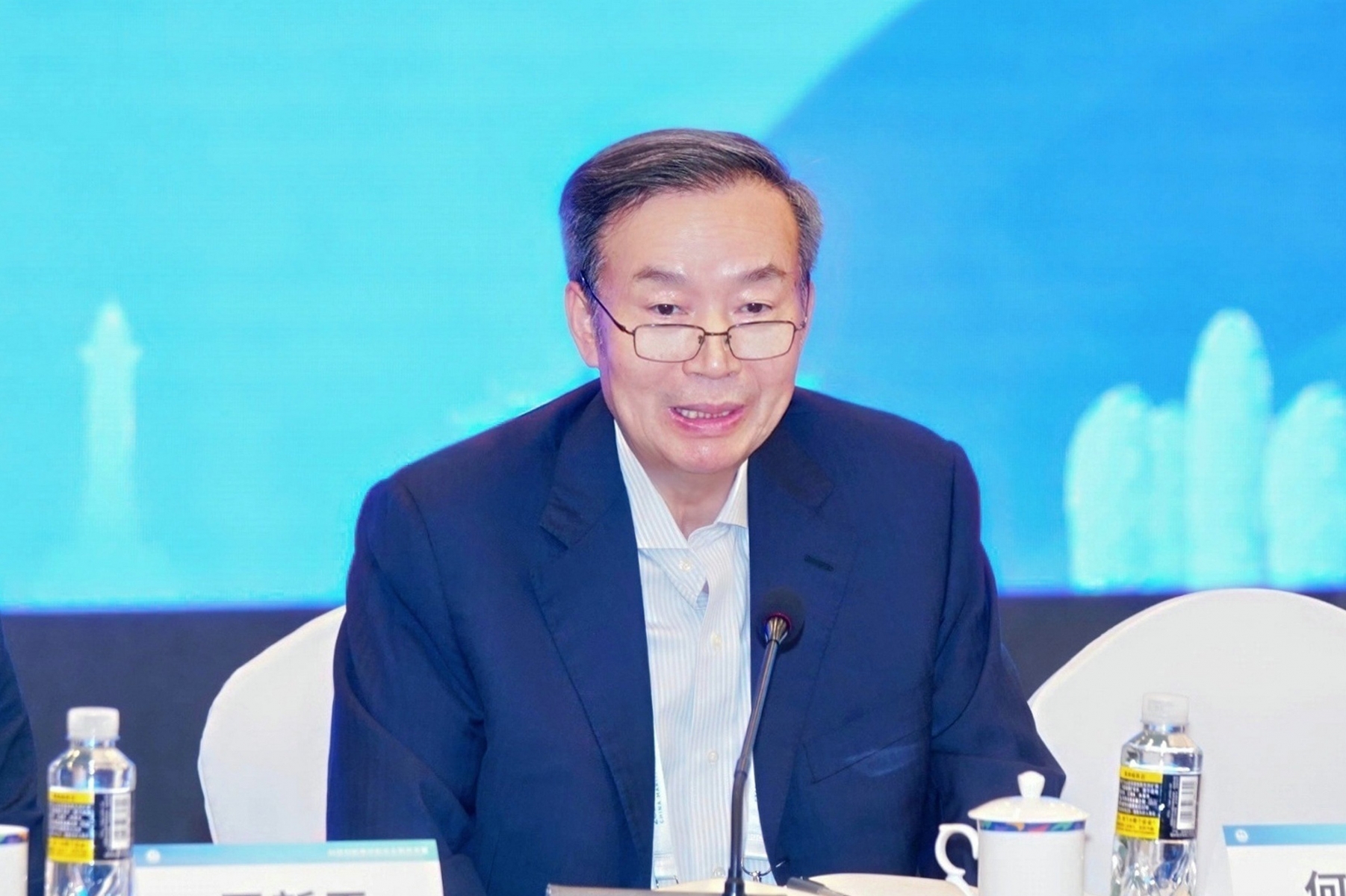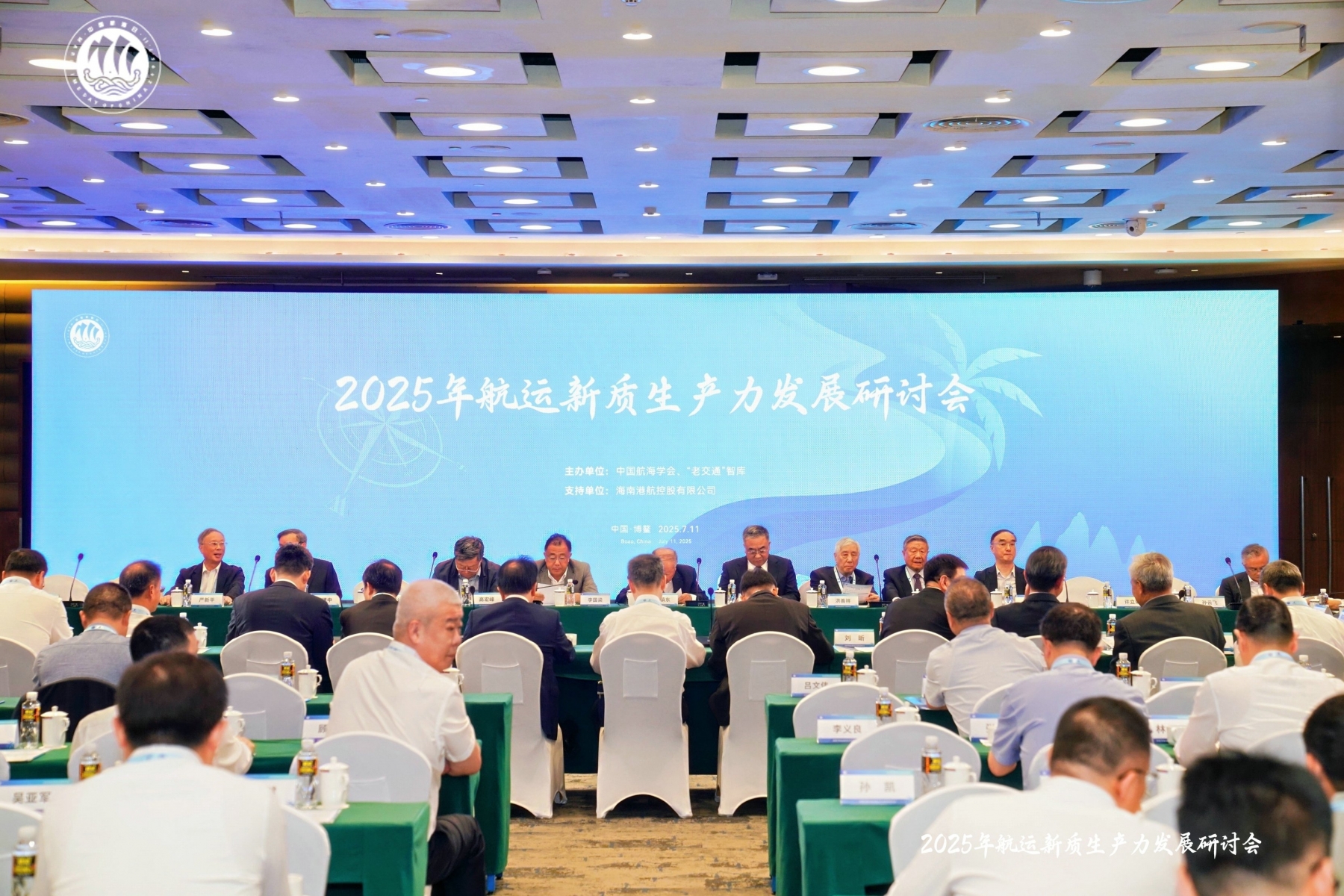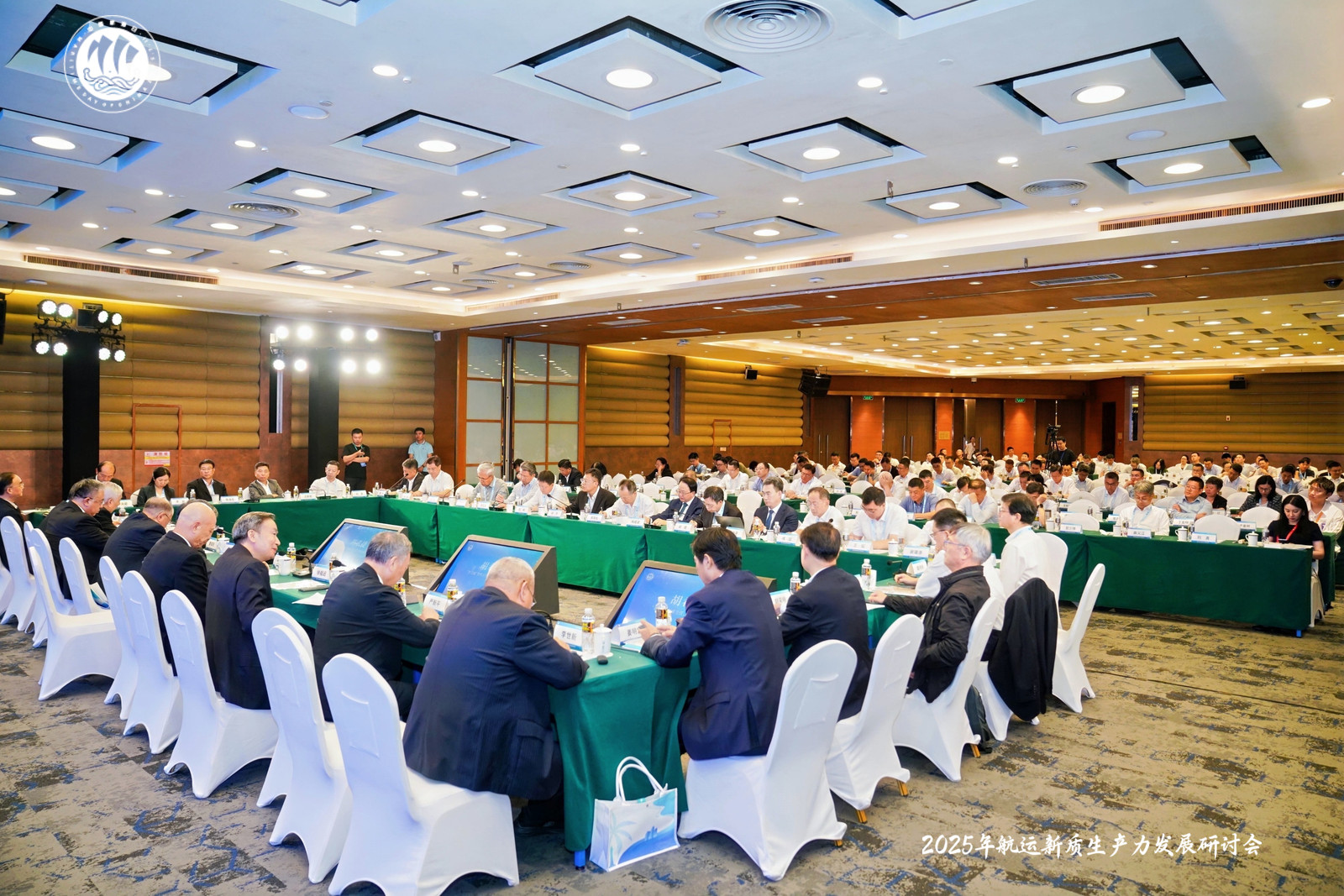On July 11, as the 21st China National Maritime Day approached, the 2025 Symposium on New Quality Productive Forces in Shipping was convened in Boao, Qionghai City, Hainan Province. Fu Xuyin, Vice Minister of Transport, and Li Guoliang, Vice Chairman of the Hainan Provincial Committee of the Chinese People's Political Consultative Conference (CPPCC), attended the meeting, with China Institute of Navigation President He Jianzhong chairing the event. Former Transport Minister Huang Zhendong and other consultants from the “Senior Transport Experts” think tank joined the discussions. Representatives from relevant bureaus and departments of the Ministry of Transport, subordinate units, large - scale shipping port enterprises, universities, research institutes, professional societies, and associations participated in lively panel discussions and exchanges.

The symposium, themed “Tech Innovation for New Quality Productive Forces in Shipping”, was co - hosted by the China Institute of Navigation and the “Senior Transport Experts” think tank, with support from Hainan Ports & Shipping Holdings Co., Ltd.

Shouldering the Mission and Striving to Accelerate the Building of a Strong Transportation Nation
Developing new quality productive forces in the shipping industry is not only an inevitable path to achieving high-quality development in the sector but also a strategic move to enhance the efficiency of the national comprehensive transportation system and solidify the foundation of the strategy for building a strong transportation nation.
Fu Xuyin emphasized that 2035 marks a critical period in the construction of a strong transportation nation. Guided by Xi Jinping Thought on Socialism with Chinese Characteristics for a New Era, it is imperative to set our sights on the strategic goal of building a strong transportation nation, focus on high-quality development as the top priority, accelerate the cultivation and expansion of new quality productive forces, and drive high-quality development in the industry at a higher level to provide better support for expediting the construction of a strong transportation nation. He proposed that the development of new quality productive forces should be prioritized to drive high-quality development in the shipping industry, enhance the overall factor productivity of the sector through technological innovation, and accelerate the transition to green and low-carbon operations. In the next steps, efforts should be made to strengthen innovative breakthroughs in key technologies, foster innovation in production organization and management models, cultivate and expand new business forms, while also enhancing industrial synergy.
Li Guoliang, Vice Chairman of the Hainan Provincial Committee of the Chinese People’s Political Consultative Conference, stated that Hainan Province would leverage its unique advantages and take practical measures to foster new quality productive forces in the shipping industry. The province will adhere to smart empowerment to create the “ultimate brain” for shipping, expedite the intelligent upgrading of traditional ports, and establish a “one-stop” intelligent logistics service platform. It will also pursue green development to enhance the “ecological foundation” of shipping, deploy integrated facilities for wind, solar, hydro, and energy storage, and construct a multi-energy complementary system. By capitalizing on the policy advantages of the Free Trade Port, Hainan will accelerate the establishment of an international bulk commodity resource allocation center and an international comprehensive maritime service support base, building a shipping ecosystem with international competitiveness.
Hu Xijie, Director of the “Senior Transport Experts” Think Tank and former Vice Minister of Transport, said that China's shipping industry has a solid foundation for cultivating new quality productive forces. As the world’s largest manufacturer and global goods trader, and through the continuous efforts of generations of transportation professionals, China has become a major shipping nation with the largest volume of shipping facilities, the highest volume of transported goods, and a ship fleet size ranking among the top in the world. The shipping industry should seize the opportunities presented by the new round of technological revolution and industrial transformation, pursue both technological and industrial innovation simultaneously, promptly apply technological innovation achievements to the shipping sector and its industrial chain, and build a modern shipping system to provide strong support for accelerating the construction of a strong transportation nation.
Coordinated Planning and Fostering Synergistic Development Momentum
The “Senior Transport Experts” Think Tank and relevant experts have put forward constructive opinions and suggestions on how to promote the development of new quality productive forces in the shipping industry.
Huang Zhendong stated that it is essential to strengthen scientific research-driven development and leverage innovation as the “leading role” in fostering new quality productive forces. Emphasis should also be placed on talent cultivation and the improvement of governance systems to provide intellectual momentum and a stable, orderly institutional environment for industry advancement. Former Vice Minister of the Ministry of Transport, Weng Mengyong, expressed that the development of new quality productive forces should integrate the pursuit of innovation with practicality, ensuring precise alignment between technological innovation and market demand, while effectively managing the transition of traditional industries and the cultivation of emerging business forms. Gao Hongfeng, also a former Vice Minister of the Ministry of Transport, recommended promoting the application of new energy vessels in inland shipping and focusing on overcoming technological bottlenecks in new energy storage and transportation. He also suggested adopting a multi-party collaborative model to strengthen cross-industry linkage mechanisms. Xu Zuyuan, another former Vice Minister of the Ministry of Transport, proposed focusing on the development needs of inland container logistics, conducting a new round of planning adjustments and construction for high-grade inland waterway networks in the Yangtze River Delta. He also emphasized the need to cultivate a group of competitive, specialized inland container shipping companies representing advanced productive forces, actively create a “Yangtze River Delta model” for decarbonized shipping, and solidify the demonstration project for multimodal transport hubs in the region. Additionally, he highlighted the importance of cultivating professional talent in inland shipping and establishing a comprehensive education and training system, as well as actively developing human resources projects for inland shipping. Xu Lirong, Chairman of the China Shipowners’ Mutual Assurance Association, believed that under the current international trade situation, it is crucial to increase the proportion of state-owned shipping capacity, leverage the expanded open shipping policies of the Hainan Free Trade Port, and cultivate a fleet flying the Five-Star Red Flag. He also stressed the importance of carrier selection to strengthen transportation dominance. Sun Yunfei, Deputy General Manager of COSCO Shipping Group, shared the group's remarkable practices in recent years from four aspects: improving the scientific and technological innovation governance system, creating a diversified and collaborative innovation ecosystem, promoting integrated scientific and technological innovation in the “cargo-vessel-personnel” triad, and transitioning towards green, low-carbon, and intelligent operations. Li Tianbi, former Chief Engineer of the Ministry of Transport, suggested improving the battery energy density and safety of electric vessels to ensure their safe and sustainable operation. He also recommended conducting organized research on key core technologies and coordinating the establishment of a cross-regional, cross-departmental, and cross-sectoral linkage mechanism involving government, industry, academia, research, and application. Jiang Mingbao, another former Chief Engineer of the Ministry of Transport, proposed the comprehensive development of smart ports and the coordinated promotion of automated terminal construction for various types of terminals, including container, bulk cargo, general cargo, and multi-purpose terminals.
Policy Guidance: Building a Modern Inland Waterway Shipping Development System
Inland waterway shipping serves as a vital east-west and north-south transportation corridor, playing a significant role in strengthening the domestic large-scale circulation and supporting the dual circulation of domestic and international markets.
Guo Qingsong, deputy director of the Water Transport Bureau of the Ministry of Transport, stated that efforts should be made to focus on new quality productivity, comprehensively promote the upgrading and transformation of various elements such as ships, ports, and navigation, accelerate the green and intelligent transformation of inland waterway shipping infrastructure and transportation equipment, enhance the organization and intelligence level of transportation services, and systematically build a modern inland waterway shipping development system. Liu Xin, director of the Transportation Research Institute of the Ministry of Transport, suggested giving full play to the main channel role of trunk waterways, comprehensively improving the navigability of waterways in the Yangtze River Delta and the Pearl River Delta water networks, prioritizing the removal of bottlenecks and chokepoints on provincial-level national high-grade waterways, and focusing on the construction of unqualified sections of tributary waterways.
Multi-Measures: Promoting the Transformation and Upgrading of Ports
Ports are fundamental and pivotal facilities, serving as a crucial support for economic development.
Yin Jie, deputy director of the Department of Transportation of Hainan Province, stated that Hainan will make concerted efforts in three dimensions: smart ports, green development, and institutional innovation. It will adhere to the principle of "one leading port and multiple coordinated ports", forming a smart port cluster with complementary functions and data interconnection. It will promote the green transformation of infrastructure through the dual drive of "green ports and green vessels". It will maintain a pioneering spirit and strive to build an "Hainan model" for institutional innovation, aiming to create a shipping service ecosystem with international competitiveness. Tao Chengbo, chairman of Zhejiang Provincial Port Group Co., Ltd., introduced that the Zhejiang Provincial Port Group adheres to the principle of "innovation in science and technology and industry", achieving new breakthroughs in the automation transformation of traditional terminals. The "Four Ports" (seaport, land port, air port, and information port) linkage cloud platform, centered on these four ports, has been continuously upgraded and iterated, achieving "one network intelligent connection" covering the entire province and expanding to other regions.
Innovation and Research: Promoting the Industrialization of Intelligent Shipping
Facing the cutting-edge of global science and technology and major industry demands, to better leverage the role of science and technology, Liu Peng, director of the Water Transport Research Institute of the Ministry of Transport, suggested enhancing the advanced nature, leading position, safety and resilience, sustainability, and guarantee of international shipping through five intensifications: intensifying scientific research, enhancing the advanced nature of development; intensifying the role of standards and rules, enhancing the leading position of development; intensifying problem-oriented approaches, enhancing the safety and resilience of development; intensifying open cooperation, enhancing the sustainability of development; and intensifying element support, enhancing the guarantee of development. Zhang Baochen, vice president of the China Institute of Navigation and president of the International Association of Institutes of Navigation (IAIN), stated that China has achieved a series of innovations in intelligent navigation technology, ranking among the leading countries in global intelligent navigation technology. It has achieved full autonomy and control over key technologies, system equipment, and operational technology systems, laying a technical and practical foundation for promoting the development of intelligent shipping in China and deeply participating in the formulation of the International Maritime Organization's MASS rules and international competition in intelligent vessels.
Talent as the Foundation: Strengthening Soft Power Construction
Although China's transportation science and technology have made significant progress in recent years, its original innovation capacity is still relatively weak, and there is a shortage of top-notch scientific and technological talents.
Shan Hongjun, president of Dalian Maritime University, stated that efforts should be made to promote scientific and technological innovation in line with the connotation and characteristics of new quality productivity in the transportation field; smooth the virtuous cycle of education, science and technology, and talent, and improve the working mechanism for talent cultivation, introduction, utilization, and reasonable flow; optimize the discipline settings and talent cultivation models of higher education institutions in line with new trends in science and technology, and cultivate urgently needed talents for the development of new quality productivity and high-quality development. Chu Beiping, the president of Shanghai Maritime University, suggested that higher education institutions should fully leverage their core role in talent cultivation, deepen theoretical innovation and policy research in the field of maritime arbitration, establish a targeted training model of "arbitration + foreign languages + international law", encourage students to engage in immersive learning at international insurance institutions and organizations, and build a professional talent team with both international vision and local experience, providing continuous intellectual support and talent guarantee for the sustainable development of the Shanghai Maritime Arbitration Center.

This year marks the third consecutive year that a thematic discussion event focusing on industry hot topics has been held during the China Maritime Day Forum. The scale of this year's seminar has reached approximately 200 participants, a further increase compared to previous years. During the conference, all parties further consolidated their consensus, strengthened collaboration, and will actively contribute to the cultivation and development of new productive forces in the shipping industry, offering wisdom and strength for the high-quality development of China's shipping industry and the accelerated construction of a transportation power.
